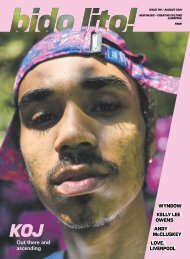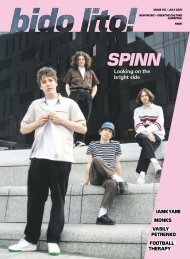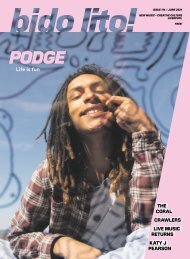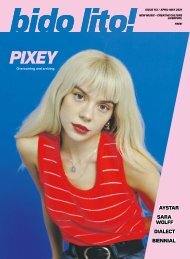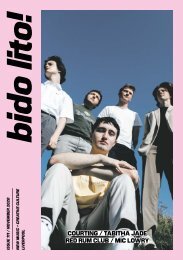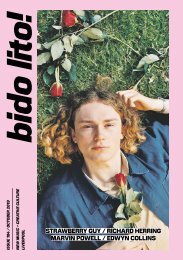Issue 42 / March 2014
March 2014 issue of Bido Lito! Featuring VEYU, SEAWITCHES, THE CYCLIST, THE MEN, MIKE BADGER and much more.
March 2014 issue of Bido Lito! Featuring VEYU, SEAWITCHES, THE CYCLIST, THE MEN, MIKE BADGER and much more.
Create successful ePaper yourself
Turn your PDF publications into a flip-book with our unique Google optimized e-Paper software.
12<br />
Bido Lito! <strong>March</strong> <strong>2014</strong><br />
Mike<br />
Badger<br />
And The<br />
Roots Of<br />
Liverpool<br />
Words: Richard Lewis<br />
Illustration: Hannah Cassidy / hannahcassidycreative.tumblr.com<br />
Music<br />
In addition to releasing over a dozen albums, co-founding<br />
a record label, regularly touring across the southern states of<br />
the USA and establishing The La’s, MIKE BADGER is the de facto<br />
authority on roots music in Merseyside. Backed by The Shady<br />
Trio since 2010, the singer is preparing the follow-up to 2012’s<br />
Lucky 13 LP with a single for Record Store Day, highlighting an<br />
insatiable appetite for musical activity that runs alongside his<br />
twin occupations as an artist and sculptor.<br />
As part of the Liverpool Acoustic Festival at the Unity Theatre<br />
this month, Mike Badger will appear in conversation with Bido<br />
Lito! Editor-in-Chief Craig G. Pennington to discuss the indelible<br />
influence roots music, country, bluegrass, rockabilly and folk<br />
continues to have on the city’s musical landscape. “With Liverpool<br />
being a Celtic city, country is huge here,” Mike explains. “Everything<br />
to do with Liverpool and its musical heritage is all directly linked<br />
with its geography. The more you read about it, the more you<br />
realise Liverpool was the first place in the country – even before<br />
London, because of the river – to get all that American music, and<br />
it had been since the war. It’s part of the fabric: it’s very heartfelt<br />
music, it’s story music, and that’s a very Scouse thing. It’s working<br />
man’s music and that’s such an important point,” Mike states.<br />
The almost mythologised figure of the ‘Cunard Yank’, workers<br />
on Liverpool’s shipping lines who frequently visited the States<br />
from the 1920s onwards, enabled the city to be ahead of the<br />
curve in picking up music from across the Atlantic via the influx<br />
of records purchased Stateside. “When people had liberty after<br />
World War II and wanted to express themselves, they could do<br />
in America and that’s what started [it all], music that came from<br />
African and European roots,” Mike notes.<br />
Mike can vividly recall his first introduction to country music’s<br />
more rambunctious cousin. “I remember hearing Buddy Holly in<br />
Kirklands [now The Fly in the Loaf] one afternoon being pumped<br />
out through the system when I was about 16. And I just thought<br />
‘Oh my God, what the hell is that?’ It really did shake me up.<br />
bidolito.co.uk<br />
Around that time I was going to Eric’s, seeing The Undertones,<br />
The Pretenders, Madness, The Cure, and you wouldn’t know who<br />
they were, you’d just go along and see what band was playing.<br />
Then, in the early 80s I really got into rockabilly, which is basically<br />
the country end of rock ‘n’ roll.”<br />
Deriving its name from the portmanteau of rock ‘n’ roll and<br />
hillbilly (the name given to Scottish hill farmers who settled in<br />
the Southern states in the 1800s), the genre’s impact on Liverpool<br />
music in the 1950s was colossal. Johnny Burnette And The Rock<br />
N Roll Trio (“fifties punk” according to Mike) were cited by John<br />
Lennon as producing the one album he would play all the way<br />
through without lifting the needle. Influencing US alt. rock bands<br />
of the 1980s, rockabilly found an echo in the groundbreaking<br />
output of The Cramps and The Gun Club, who plaited the form<br />
with a gothic sensibility.<br />
The genre had a huge affect on Mike’s own music from the<br />
off, his original vision for The La’s being “heavily rhythmical,<br />
discordant rockabilly.” Early track My Girl Sits Like A Reindeer<br />
(later reworked as Feelin’) provides a prime example of this<br />
initial idea for the band’s sound. After founding The La’s with Lee<br />
Mavers in 1984, Mike co-piloted the band for two years before an<br />
acrimonious split which saw Mavers effectively becoming sole<br />
proprietor of the group, a situation that continues to this day as<br />
a never-ending series of line-ups make sporadic returns to the<br />
stage, despite the absence of any new material since the band’s<br />
spellbinding 1990 debut LP.<br />
Hunting down the lesser-known practitioners of rockabilly<br />
in the pre-internet era when only the likes of Record Collector<br />
would be likely to feature acts from previous decades was a<br />
vastly more complicated task than in the present age of AllMusic<br />
and Wikipedia. “Once I accessed where all this came from it was<br />
that that did it for me,” Mike says. “I wanted to get as far back<br />
as possible into the origins of it, from 1953 to 1954 when it was<br />
moving from country bop into rock ‘n’ roll. I went out and made<br />
a concerted effort to discover it; it became a passion I had to<br />
spend all my time getting to know. I’ve never found anything that<br />
resonates with me deeper than rockabilly, music-wise.”<br />
Fortuitously, Mike happened to be in the right place for<br />
exploring genres that were outside of the era’s mainstream, due<br />
to the city’s leading music retailer, which provided positive proof<br />
of roots music’s enduring influence in Liverpool. “People came<br />
from all over the north of England and Wales to go to Probe; it was<br />
the only place you could get these records,” he explains. “I used<br />
to walk right through Probe [then located on Button St] and go to<br />
the back and look at the racks there and just try and discover new<br />
compilations. They had a lot of obscure country and rockabilly<br />
comps and I’d just paw through them.” Running the gamut from<br />
the lesser known (Charlie Feathers, Eddie Cletro, Johnny Jano) to<br />
the iconic (Gene Vincent, Buddy Holly, Elvis Presley, Carl Perkins),<br />
Mike swiftly became an archivist of the form.<br />
The Viper Label (home to Edgar ‘Summertyme’ Jones),<br />
established by Mike and fellow ex-La and Onset guitarist Paul<br />
Hemmings in 1999, has issued several rockabilly-themed<br />
compilations, a continuation of the collections that formed Mike’s<br />
tastes back in the early 1980s. Assembling the albums linked<br />
directly to the singer’s unabated thirst for crate-digging to track<br />
down more obscure gems from the era. “You keep on finding new<br />
tracks and you go ‘How come I’ve never heard that<br />
before? It’s<br />
sensational!’” Mike enthuses. “I’ve been collecting it seriously for<br />
thirty years and my real interest is the core of all this, the origins<br />
of it, and it’s still a voyage of discovery for me.”<br />
Liverpool Acoustic Festival runs at the Unity Theatre on 21st and<br />
22nd <strong>March</strong>, with Mike Badger’s keynote discussion taking place at<br />
6pm on Saturday 22nd <strong>March</strong>.<br />
Action Packed Rockabilly next takes place on 8th <strong>March</strong> at Camp<br />
and Furnace.<br />
mikebadger.co.uk





